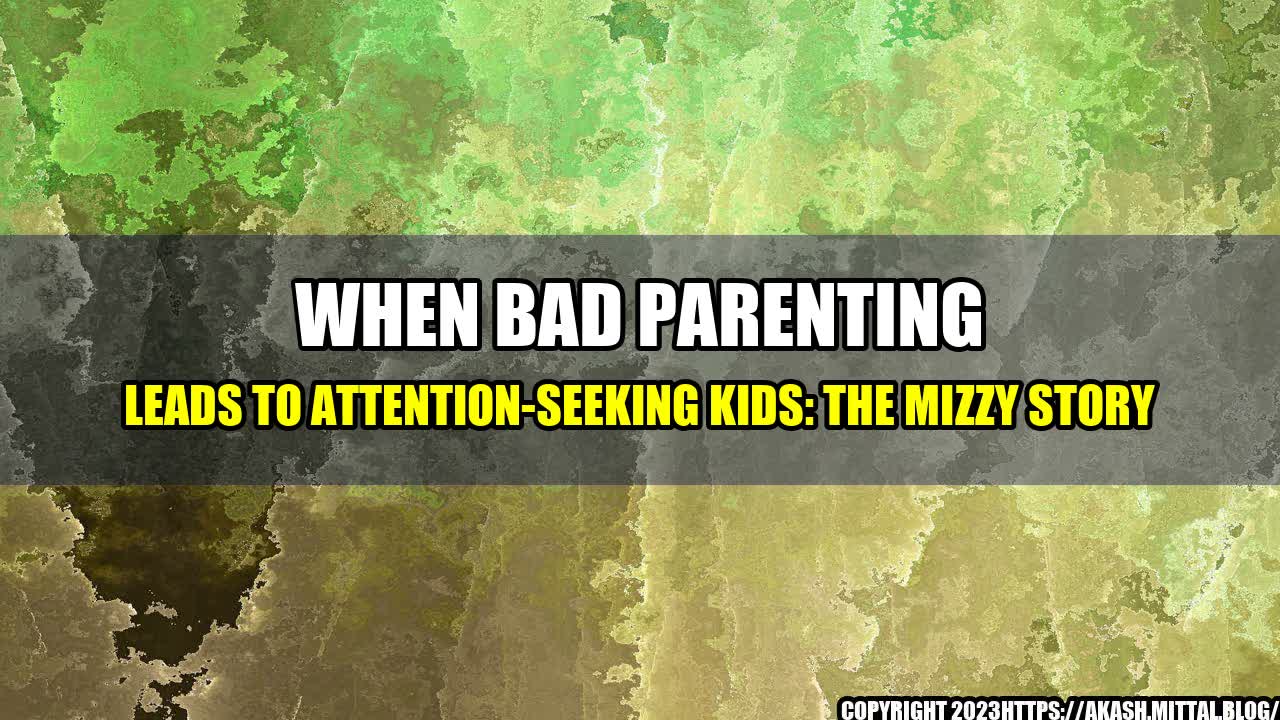Have you ever met someone who always seems to be seeking attention, no matter the situation or company? Meet Mizzy, a 10-year-old girl who craves attention like a plant craves sunlight. She interrupts conversations, makes inappropriate jokes, and even acts out in public just to get noticed. Unfortunately, Mizzy's behavior is a classic example of how bad parenting can lead to attention-seeking kids with emotional issues.
The Importance of Parental Attention
Children need attention and support from their parents to feel loved, valued, and secure. When parents are absent, dismissive, or inconsistent in their attention-giving, children can feel neglected, rejected, and insecure. This can lead to various emotional and behavioral problems, such as:
- Low self-esteem
- Anxiety
- Depression
- Anger
- Attention-seeking behavior
- Aggressiveness
- Social isolation
- Academic difficulties
Children who don't get enough attention from their parents may seek it elsewhere, such as from peers, teachers, or strangers. They may also develop maladaptive strategies to get attention, such as acting out, being disruptive, or making up stories. Unfortunately, these behaviors may only lead to more negative attention, punishment, or rejection, which reinforces the child's belief that they are unlovable or unworthy.
The Roots of Mizzy's Attention-seeking Behavior
Mizzy's parents are both busy professionals who work long hours and have little time for their daughter. They often leave her with a nanny or a relative, who may not be as attentive or nurturing as a parent. Mizzy feels lonely, bored, and ignored at home, so she seeks attention from anyone who will give it to her. She interrupts her parents' phone calls, texts, or emails, and demands their full attention. She also makes inappropriate jokes, such as mocking people's appearances or disabilities, to shock or impress others. She has even pretended to be sick or injured to get sympathy and care from her parents.
The Consequences of Mizzy's Attention-seeking Behavior
Mizzy's parents are frustrated, embarrassed, and worried about their daughter's behavior. They scold her, punish her, and even ignore her when they can't stand her antics anymore. However, their reactions only make things worse. Mizzy feels rejected, misunderstood, and resentful, which triggers more attention-seeking behavior. She starts to act out even more, such as by vandalizing property, lying, or stealing. She also becomes more isolated, as her peers and teachers start to avoid her due to her disruptive behavior. Mizzy's academic performance suffers, as well, as she finds it hard to concentrate or follow rules.
The Solutions for Mizzy's Attention-seeking Behavior
Mizzy's situation is not unique, and there are many ways to help her overcome her attention-seeking behavior and emotional issues. Here are three practical tips that her parents and caregivers can try:
- Listen to Mizzy's needs and feelings, and show her empathy and understanding. Mizzy may not know how to express her emotions in a healthy way, but she still needs to feel heard and validated. When she interrupts, instead of scolding her, ask her politely to wait her turn. When she makes an inappropriate joke, explain to her why it is hurtful or disrespectful, and suggest a more positive way to express herself. When she pretends to be sick, check on her and comfort her, but also tell her that lying is not acceptable.
- Create a consistent and supportive environment for Mizzy, where she can feel safe, secure, and appreciated. Mizzy needs to know that she can count on her parents and caregivers for love, guidance, and consistency. Schedule regular family activities, such as game nights, hikes, or movie nights, where everyone participates and enjoys each other's company. Praise Mizzy for her positive behaviors and achievements, such as when she helps others, does her homework, or tries new things. Provide her with age-appropriate challenges and opportunities for growth, such as learning a new skill, joining a club, or volunteering.
- Seek professional help if Mizzy's attention-seeking behavior and emotional issues persist or worsen. Sometimes, parents and caregivers may not have the skills, resources, or time to address their children's problems effectively. In such cases, it may be helpful to consult with a mental health professional, such as a therapist, counselor, or psychologist. A professional can assess Mizzy's needs and provide her with evidence-based interventions, such as cognitive-behavioral therapy, play therapy, or family therapy. They can also support Mizzy's parents and caregivers in developing effective strategies for managing her behavior and promoting her well-being.
If Mizzy's parents and caregivers apply these tips consistently and with patience, they can help her overcome her attention-seeking behavior and emotional issues. Mizzy can learn to express herself in healthier and more positive ways, and to feel valued and loved by her family and peers. They can also prevent her from developing more serious problems in the future, such as addiction, delinquency, or mental illness. However, all of this requires a commitment to changing the parenting style and habits that may have contributed to Mizzy's problems in the first place.

Curated by Team Akash.Mittal.Blog
Share on Twitter Share on LinkedIn